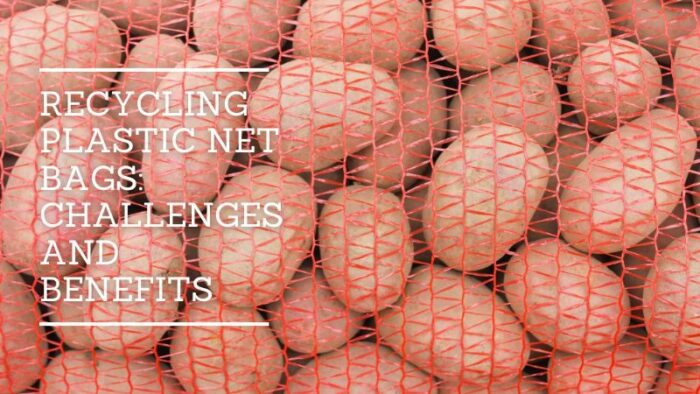Yes, recycling plastic net bags, also known as mesh bags or netting bags, is possible. However, it can be challenging to recycle them because they are made of a lightweight and flexible material that can be difficult for recycling facilities to process.
To recycle plastic net bags, you must follow the guidelines of your local recycling program. Many programs do not accept plastic net bags because they can get tangled in the machinery at the recycling facility.
If your local recycling program does not take plastic net bags, you can bring them to a store or retailer with a plastic bag recycling program. Some stores have bins where you can drop off plastic bags, including plastic net bags, to be recycled.
It is also important to remember that it is always better to reduce your use of plastic net bags first rather than try to recycle them. Reusing mesh bags or using bags made from other materials, such as cotton or canvas, is a more sustainable option.
Benefits of Recycling Plastic Net Bags
Recycling plastic net bags has several benefits:
- Conserves natural resources: Recycling plastic net bags reduces the demand for new plastic made from non-renewable resources such as oil and natural gas.
- Reduces pollution: Manufacturing new plastic generates greenhouse gas emissions and can contribute to air pollution. Recycling plastic net bags reduces these negative environmental impacts.
- Saves energy: Recycling plastic requires less energy than producing new plastic from raw materials. This means recycling plastic net bags can help reduce energy consumption and greenhouse gas emissions.
- Keeps waste out of landfills: When plastic net bags are recycled, they are transformed into new products rather than sent to landfills, which can take hundreds of years to break down.
Overall, recycling plastic net bags helps to conserve natural resources, reduce pollution, save energy, and keep waste out of landfills, making it an essential step in promoting a more sustainable future.

What Happens to Recycled Plastic Net Bags?
When plastic net bags are recycled, they are first collected and sorted by type. The recycling begins by shredding the plastic into small pieces, which are then cleaned and melted down.
The melted plastic is then molded into new products, such as plastic lumber, pipes, and other items.
The specific products that recycled plastic net bags can be turned into depend on the type of plastic they are made of and the quality of the material. Some everyday products made from recycled plastic include outdoor furniture, fencing, decking, and landscaping borders.
It is worth noting that recycling plastic net bags can be challenging due to their lightweight and flexible nature. They can easily get tangled in the recycling facilities’ machinery, making them difficult to process. As a result, not all recycling programs accept plastic net bags, and it may be necessary to bring them to a store or retailer with a plastic bag recycling program.
The Environmental Impacts of Plastic Net Bags
Plastic net bags can have negative environmental impacts in many ways:
- Pollution: The production and disposal of plastic net bags can contribute to air and water pollution. Manufacturing plastic generates greenhouse gas emissions, and the chemicals used to make plastic can leach into the environment and contaminate soil and water. When plastic net bags are discarded, they can end up in landfills, where they can take hundreds of years to break down and release harmful chemicals into the soil and water.
- Habitat destruction: Plastic net bags can harm wildlife when they end up in the environment. Sea turtles and other marine animals can become entangled in plastic netting, leading to injury or death. Plastic net bags can also be mistaken for food by birds and other animals, leading to ingestion and potential death.
- Waste: Plastic net bags are not biodegradable, meaning they do not break down naturally in the environment. This means they can remain in the background for a long, contributing to litter and waste.
Plastic net bags can negatively impact the environment due to pollution, habitat destruction, and waste. It is vital to reduce our use of plastic net bags and recycle them when possible to minimize these negative impacts.
Can Plastic Net Bags be Recycled with Other Plastic Bags?
Yes, you can recycle plastic net bags with other plastic bags. However, it is essential to note that not all recycling programs accept plastic net bags due to the challenges of processing them. Plastic net bags are lightweight and flexible materials that can easily get tangled in the machinery at recycling facilities.
If your local recycling program does not accept plastic net bags, you can bring them to a store or retailer with a plastic bag recycling program. Some stores have bins where you can drop off plastic bags, including plastic net bags, to be recycled.
It is also essential to follow the guidelines of your local recycling program when recycling plastic bags. Many programs have specific requirements for the types of plastic bags you can recycle, and it is essential to follow these guidelines to ensure that the bags are correctly processed.
Overall, reducing your use of plastic net bags first is always better than relying on recycling to manage them. Reusing mesh bags or using bags made from other materials, such as cotton or canvas, is a more sustainable option.
Conclusion
You can recycle plastic net bags, but they can be challenging due to their lightweight and flexible nature. Recycling plastic net bags has several benefits, including conserving natural resources, reducing pollution, saving energy, and keeping waste out of landfills.
However, reducing your use of plastic net bags first is always better than relying on recycling to manage them. Reusing mesh bags or using bags made from other materials, such as cotton or canvas, is a more sustainable option. When recycling plastic net bags, it is crucial to follow the guidelines of your local recycling program and bring them to a store or retailer with a plastic bag recycling program if necessary.

